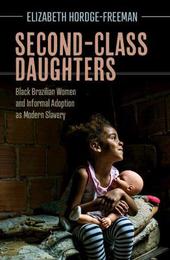
|
Second-Class Daughters: Black Brazilian Women and Informal Adoption as Modern Slavery
Paperback / softback
Main Details
| Title |
Second-Class Daughters: Black Brazilian Women and Informal Adoption as Modern Slavery
|
| Authors and Contributors |
By (author) Elizabeth Hordge-Freeman
|
| Series | Afro-Latin America |
|---|
| Physical Properties |
| Format:Paperback / softback | | Pages:271 | | Dimensions(mm): Height 228,Width 150 |
|
| Category/Genre | Slavery and abolition of slavery |
|---|
| ISBN/Barcode |
9781009087414
|
| Classifications | Dewey:362.7340981 |
|---|
| Audience | |
|---|
| Illustrations |
Worked examples or Exercises; Worked examples or Exercises
|
|
Publishing Details |
| Publisher |
Cambridge University Press
|
| Imprint |
Cambridge University Press
|
| Publication Date |
17 March 2022 |
| Publication Country |
United Kingdom
|
Description
A legacy of the transatlantic slave trade, Brazil is home to the largest number of African descendants outside Africa and the greatest number of domestic workers in the world. Drawing on ten years of interviews and ethnographic research, the author examines the lives of marginalized informal domestic workers who are called 'adopted daughters' but who live in slave-like conditions in the homes of their adoptive families. She traces a nuanced and, at times, disturbing account of how adopted daughters, who are trapped in a system of racial, gender, and class oppression, live with the coexistence of extreme forms of exploitation and seemingly loving familial interactions and affective relationships. Highlighting the humanity of her respondents, Hordge-Freeman examines how filhas de criacao (raised daughters) navigate the realities of their structural constraints and in the context of pervasive norms of morality, gratitude, and kinship. In all, the author clarifies the link between contemporary and colonial forms of exploitation, while highlighting the resistance and agency of informal domestic workers.
Author Biography
Elizabeth Hordge-Freeman is Associate Professor of Sociology, Senior Advisor to the President and Provost for Diversity and Inclusion, and Interim Vice President for Institutional Equity at the University of South Florida. She received a Fulbright grant to Brazil and Ruth Landes Memorial Fellowship to conduct this research. Her first book, The Color of Love, won three book awards, including two from the American Sociological Association (Sections on Emotions and Bodies and Embodiment).
Reviews'Second-Class Daughters is a beautifully written and theoretically rich book that offers an expansive and nuanced portrait of informal adoption in Brazil. In centering the experiences of filhas de criacao, Hordge-Freeman reveals the blurring of the line between exploitation and intimate familial ties, while also reminding us of the disturbing ways that racial pasts are layered onto the present.' Tianna Paschel, University of California, Berkeley 'Written with deep compassion, insight, sensitivity, and astute knowledge of the ways race, gender, and class structure Brazilian society, Elizabeth Hordge-Freeman's new book is a must read for all those studying Brazil. It reveals how families deemed safe and sacred by many, can be the very place where devastating and life-changing discrimination and socialization into second-class citizenship can occur. By again focusing on families, Hordge-Freeman adds another major research accomplishment to her important work on race, class, and gender in Brazil.' Bernd Reiter, Texas Tech University 'A beautifully written account of Black impoverished girls given up for 'adoption' to families to raise as their daughters who instead became unpaid exploited child workers laboring within a web of ambiguous family contexts of affective bonds of gratitude, passion, and love. Hordge-Freeman weaves these life stories to expose the legacy of colonial slavery embedded in the structural disadvantages of racialized and gendered systems of oppression. Second-Class Daughters never loses sight of the women's strategies of freedom and resistance and the structural changes required to end this labor exploitation.' Mary Romero, author of The Maid's Daughter: Living Inside and Outside the American Dream
|